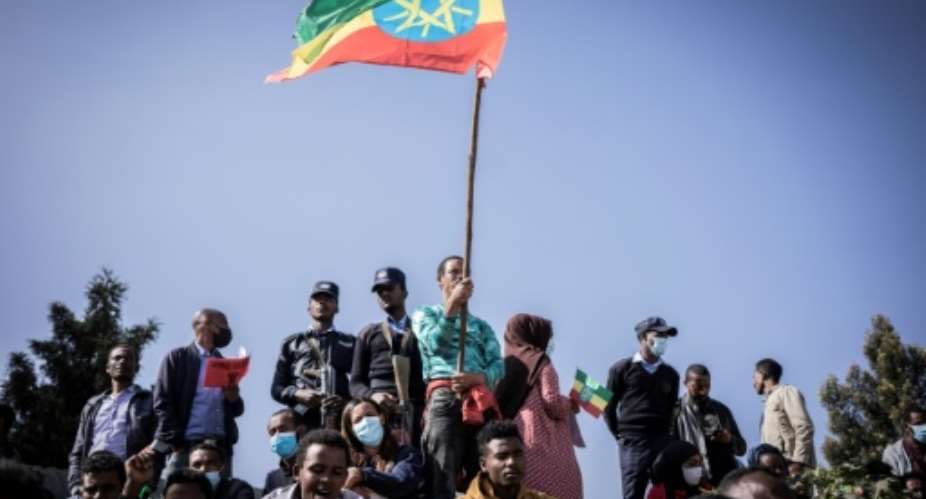Ethiopian Prime Minister Abiy Ahmed's cabinet on Wednesday endorsed cutting short a state of emergency imposed last November as rebels threatened to advance on the capital.
The decision, which must be ratified by lawmakers, highlights the government's renewed confidence after Tigray People's Liberation Front (TPLF) fighters retreated to their home region last month, though hostilities continue in some parts of northern Ethiopia.
The state of emergency declared on November 2 was initially supposed to last six months.
"Since the situation that necessitated the issuance of the state of emergency has changed, and since the threat level has been reached so that the threat can be controlled with usual law enforcement activities, it has been found necessary to shorten the enforcement period for the state of emergency," said a statement from Abiy's office.
It was not clear if the state of emergency would be terminated immediately, or when lawmakers would meet to discuss the matter.
Ethiopia's war broke out in November 2020 after Abiy, winner of the 2019 Nobel Peace prize, sent troops to topple the TPLF, which once dominated national politics.
Abiy said the move came in response to TPLF attacks on army camps.
After initially losing control of Tigray's cities and towns, the TPLF regrouped and retook the region in June, then launched offensives into Afar and Amhara.
In November 2021 the rebels claimed to be within roughly 200 kilometres (125 miles) of the capital Addis Ababa, prompting hasty evacuations as countries including the US and France urged their citizens to leave.
The state of emergency coincided with a mass mobilisation campaign credited -- along with drone strikes -- with pushing the TPLF back into Tigray.
It also triggered mass detentions of ethnic Tigrayans in Addis Ababa and elsewhere, sparking condemnation from rights groups including Amnesty International.
Abiy's government is gearing up to host an African Union summit in early February at the bloc's headquarters in Addis Ababa, a move it has described as a "big diplomatic success" given Ethiopia's recent instability.
Meanwhile the TPLF this week announced it had begun "robust" military operations in the neighbouring Afar region, a move it said was provoked by attacks on its positions by pro-government forces.





 Former Kotoko Player George Asare elected SRC President at PUG Law Faculty
Former Kotoko Player George Asare elected SRC President at PUG Law Faculty
 2024 elections: Consider ‘dumsor’ when casting your votes; NPP deserves less — P...
2024 elections: Consider ‘dumsor’ when casting your votes; NPP deserves less — P...
 You have no grounds to call Mahama incompetent; you’ve failed — Prof. Marfo blas...
You have no grounds to call Mahama incompetent; you’ve failed — Prof. Marfo blas...
 2024 elections: NPP creates better policies for people like us; we’ll vote for B...
2024 elections: NPP creates better policies for people like us; we’ll vote for B...
 Don’t exchange your life for wealth; a sparkle of fire can be your end — Gender ...
Don’t exchange your life for wealth; a sparkle of fire can be your end — Gender ...
 Ghana’s newly installed Poland train reportedly involved in accident while on a ...
Ghana’s newly installed Poland train reportedly involved in accident while on a ...
 Chieftaincy disputes: Government imposes 4pm to 7am curfew on Sampa township
Chieftaincy disputes: Government imposes 4pm to 7am curfew on Sampa township
 Franklin Cudjoe fumes at unaccountable wasteful executive living large at the ex...
Franklin Cudjoe fumes at unaccountable wasteful executive living large at the ex...
 I'll 'stoop too low' for votes; I'm never moved by your propaganda — Oquaye Jnr ...
I'll 'stoop too low' for votes; I'm never moved by your propaganda — Oquaye Jnr ...
 Kumasi Thermal Plant commissioning: I pray God opens the eyes of leaders who don...
Kumasi Thermal Plant commissioning: I pray God opens the eyes of leaders who don...
